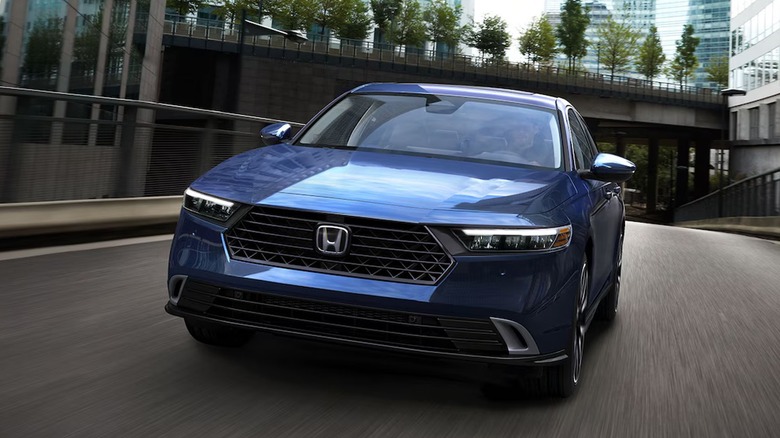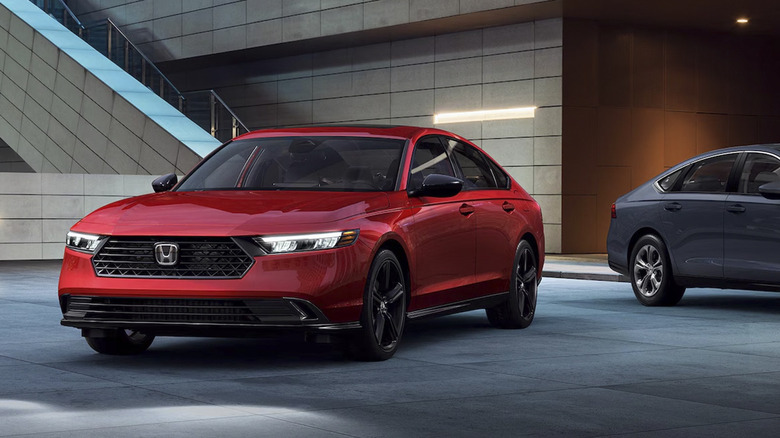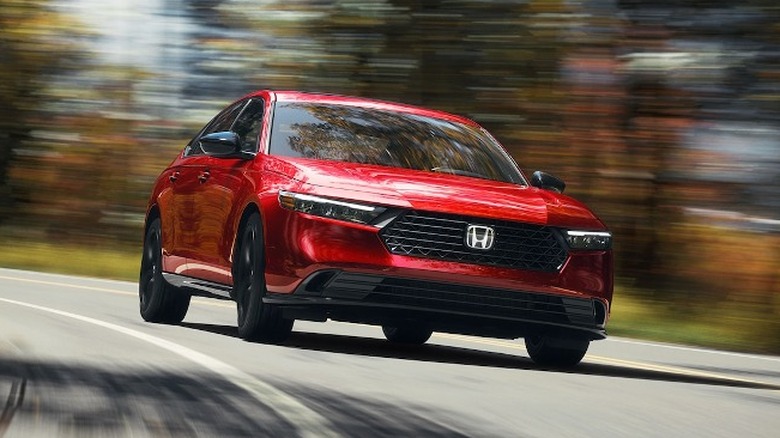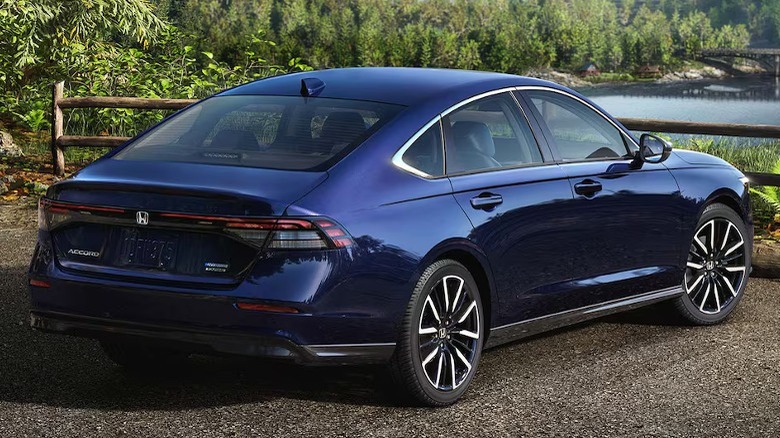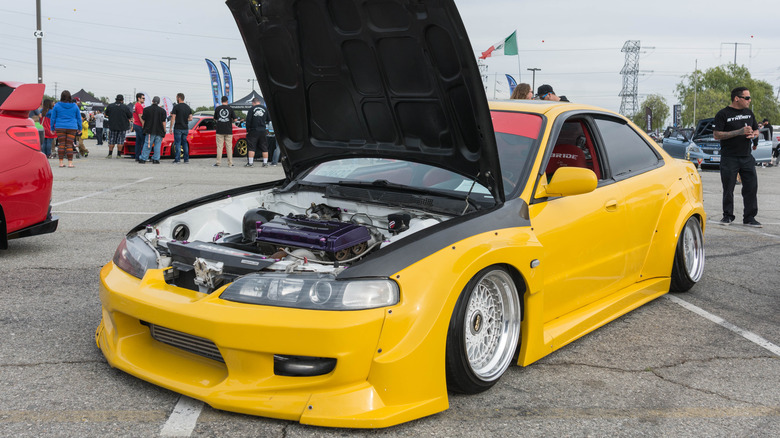How Much Does A New Honda Accord Depreciate In One Year? It's Complicated
There are a lot of upsides to buying a new car: You get the latest and greatest features, and the most up-to-date technologies. You get a vehicle with zero miles on it, giving you the peace of mind that comes with the knowledge that no hidden wear and tear is waiting to reveal itself a few months into ownership. They also typically come with warranties covering any factory mistakes that might crop up in the first few years. All that comes at a pretty big price. Cars depreciate quite a bit the moment you drive them off the lot. Even vehicles like the Honda Accord, which has a reputation for reliability and longevity, will still lose quite a bit of value in the first year.
You might be thinking about buying one of these cars. The modern (post-2023) Accord is one of the best generations that Honda has ever offered and it's one of the most fuel-efficient models you can currently get from the company. But before committing to a purchase, you might want to learn a bit more about how this significant financial asset will depreciate in the first year of ownership.
Well, the answer to that is a bit complex. I sold my old Accord a couple of years back, and I can tell you that there are a lot of variables that factor into the value of a used car. Things like trim, mileage, condition, aftermarket modification, and maintenance history can all play a role in a car's value. You can get a rough estimate by looking at the value of cars from previous generations, however.
Some trims are more expensive
One of the many factors that affect the price for both new and used vehicles is the trim. More expensive trims usually offer a higher tier of features, technologies, and design elements. There are two different trims for the regular 2024 Honda Accord: LX and EX. The LX is the more affordable option, while the EX has a few enhanced features such as a power moonroof and heated seats. Then there are four different trims for the 2024 Honda Accord Hybrid. In ascending order by price, they are: the Sport, EX-L, Sport-L, and Touring.
These different trims have different set costs on the new market, but they can also affect the price when purchasing these vehicles used. I did a quick search on Carfax and found a 2023 Honda Accord LX for $23,964, and a 2023 Honda Accord EX for $25,900, even though the LX actually had lower miles. In the same year, I found a Sport for $26,362, an EX-L for $26,950, a Sport-L for $30,499, and a Touring for $33,100. Each of them has depreciated around $4,000-$6,000.
You can typically expect similar results when buying either from dealerships or private sellers. Price estimators like Kelly Blue Book take trim into account as well. This has often been the go-to source for citing a fair price in private vehicle negotiations in my experience. This indicates that you can expect more expensive trim options to depreciate at a similar rate, but that they will maintain a gap in relative value over their more affordable counterparts.
Mileage makes a difference
The Honda Accord has a sterling reputation for being reliable, even when they get older, but that doesn't mean they run like new forever. Higher mileage means more wear and tear in the vehicle, which in turn means that it's more likely to need potentially expensive maintenance, such as belt replacements. There is a clock on how long components like these can be expected to last, and so prospective buyers will probably want to pay less for a vehicle that may need some expensive maintenance in the near future. This is the primary reason why higher mileage vehicles are valued at a lower price than low mileage vehicles, even if they are the exact same year, make, model, and trim.
According to the U.S. Department of Energy, the average car travels about 10,500 miles per year, so that should be about the mileage that buyers will be looking for in a one-year-old Honda Accord. An Accord that is driven less than this will depreciate at a slower rate than one that is driven more. A few hundred miles here or there won't make much of a difference, but those who only drive their vehicle 5,000 miles in a year will certainly be able to expect it to retain a higher value than someone with a big commute who puts over 25,000 miles on their car in the same amount of time.
Try to keep it in good condition
There are a lot of things that can negatively impact your Honda Accord's condition. Rust damage to metal and sun damage to paint can be common on older vehicles depending on the local climate, but you probably don't need to worry about either of those in the first year. With newer cars, you're more likely to be dealing with human-caused damage. Interior damage and odors, such as the smell of cigarette smoke or the lingering scent from accidentally leaving food in the cab of your car for a week, can definitely affect a car's resale value. However, the bigger point of concern is probably going to be exterior damage most of the time.
Accidents happen, and damage that is left unrepaired can dramatically lower the value of a car. This depreciation varies wildly depending on the nature and extent of the damage, so there isn't really an easy way to quantify how much value the car will lose. Kelly Blue Book narrows this down into four categories: Fair, Good, Very Good, and Excellent. It defines "Fair" as needing significant mechanical repairs; "Good" has minor cosmetic defects and mechanical problems; "Very Good" has minor cosmetic defects, but no mechanical problems; and "Excellent" essentially means that it's in perfect mechanical order and looks like it just rolled off the showroom floor.
The reported trade-in value for a "Fair" 2023 Accord LX is $21,127, while an "Excellent" version of the same car is $22,957.
Aftermarket modifications change the value
Keeping the vehicle's stock components makes it easier to tell the value, but the value may be raised or lowered with aftermarket modifications. Aftermarket stereo and headlight upgrades are common enough and they aren't usually an issue when trading in a car to a dealership or selling privately. These kinds of modifications also don't typically affect the value of a car.
More extensive modifications can be a different story, however. Honda sedans are popular in the street modding community, and it's not uncommon for their owners to upgrade the wheels, tires, suspension, exhaust, and other components. These kinds of modifications will make the car more difficult to sell since not all buyers are interested in driving modified vehicles. Some might be wary of buying a car that they believe may have been used for racing. If this is the case, then you may have to do some legwork to find a buyer who's willing to buy not only the car but the added value of the aftermarket upgrades as well.
